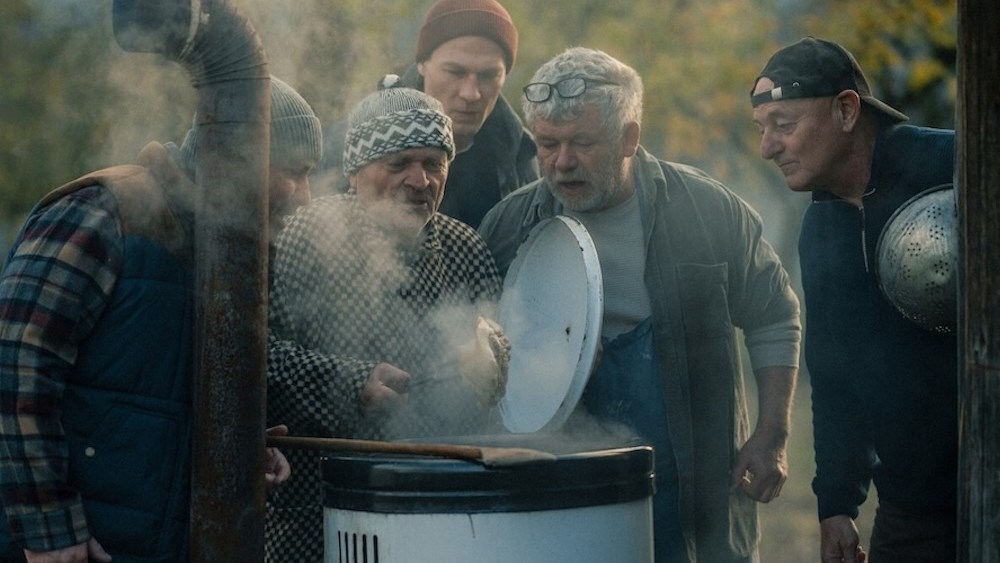Tragicomic Ode to a Czech Tradition
Vegetarians, it need hardly be said, might want to give Adam Martinec‘s funny, poignant “Our Lovely Pig Slaughter” a wide berth. Meat-eaters, however, should have fewer qualms — indeed, there’s a case to be made that the ethically minded omnivore should take it as mandatory viewing. Centering on the ancient Czech ritual of zabijacka, a day-long communal pig-butchering in which no liver, lard or loin is left behind and no opportunity for familial conflict passed over, Martinec’s doleful comedy offers a needed reminder of what meat is when not packaged onto polystyrene trays and slapped with a barcode.
More importantly, Martinec’s intimately observed screenplay and his superb, largely non-professional ensemble speak to what these meat-meets represent for aging rural communities: the chance to connect the next generations to the rites of the past while also bringing one’s increasingly scattered and urbanized clan temporarily back into the fold of the villages and farms they’ve left behind. Not that these reunions are all gravy. Though it mines a very specifically Czech strain of absurdity, “Our Lovely Pig Slaughter” fields insights into fraught family dynamics that will be familiar to anyone who heads home on the holidays and finds such multi-generational gatherings, affectionate though they may be, rife with resentments and recriminations. Here, those tensions are underlined by the unspoken knowledge that the zabijacka custom — which is technically outlawed under EU meat-production guidelines — is on its last trotters, but unlike the unfortunate swine who for centuries have met their end as part of this Bohemian ritual, family traditions tend to die a slow and painful death.
The pig whose time has come this day is indeed lovely. A 120-kilo hog who is snuffling contentedly around in a barn, it’s been raised by elderly paterfamilias Deda (Miloslav Čížek) as the latest – and unbeknownst to everyone else, last – in a long line of animals bred for this annual purpose. Deda’s great-grandkids are petting it and offering it apples when they are shooed away and warned not to feed the pig “so it has clean bowels.” On this homestead, surly pragmatism trumps sentimentality every time, and not just in matters of livestock. Deda’s son, Karel (a terrific turn from Karel Martinec, the filmmaker’s own father) is an ornery recent widower who is truculent with his two adult daughters Lucie (Pavlína Balner) and Romana (Karin Bilíková). They in turn hang in the kitchen with their grandmother (Kristina Kaniová) chopping mountains of onions, gossiping about their husbands (Lucie’s marriage is on the rocks) and rolling their eyes at Karel’s strutting self-importance as he preps for the butchery outside.
The gender divide is even more pronounced than the generational one, with the women mostly indoors, united in exasperation with their men, and the men standing about outside drinking homebrew hooch and swapping wry strategies about how best to manage their outspoken women. It makes “Pig Slaughter” into a gentle satire on proudly unreconstructed, meaty Czech manhood (“Vegetarian?” gasps Tonda, at one point, as though the very word tastes of raw turnip). But it’s also a source of pretty universal humor, for all of us who know the paradox of Dads who wouldn’t be caught dead at the kitchen stove, but imperiously take over as chef as soon as the word “barbecue” is uttered. Or the parent who never cooks a weekday meal but regards roasting the perfect holiday-season turkey as his personal White Whale.
A 15th-century Hussite choral plays on the soundtrack, lending a drolly epic grandeur to the arrival of Tonda (Antonín Budínský) the local man tasked with the actual execution. Waving him into the muddy driveway in his new second-hand car is apparently a five-man job. But very quickly, even while DP David Hofmann’s cinematography retains its understated composure, things start to go south. Tonda’s ammunition is damp. Lucie and her husband Aleš (Aleš Bílík) argue over whether to let their young son witness the execution, prompting the boy to run away. And once the deed is finally done, and the carcass has been drained of its precious blood — a vital ingredient — Karel plunges into a foul mood when he slips and upends the entire steaming basin onto himself, like a tragicomic Czech “Carrie.”
Accidents and incidents pile up, exposing the faultlines in Karel’s relationships with, well, just about everyone. So it’s almost a miracle that somehow, all the while, the actual work has been going on – the scraping, hacking, chopping, mincing, rendering, washing, stuffing, boiling and brining that has by nightfall transformed pig into pork. As all four generations finally get to enjoy the fatty fruits of their labor, Martinec lands on the graceful, rueful, clear-eyed conclusion that even if long-maintained traditions can yield moments of harmony and happiness, perhaps it’s not the worst thing in the world that when their time comes, they too must pass.


